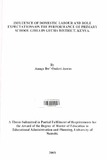| dc.description.abstract | A common and pervasive challenge to achievement of universal education especially in rural areas is the continued poor performance of girls that not only negates but also hinders their school attendance. As such, factors that cause this sustained poor performance and attendance are critical in understanding and subsequently addressing this challenge.
This study focused on addressing the poor performance of girls in rural day- primary schools by investigating the domestic labour phenomenon in order to identify factors that affect the education of rural girls. It was conducted in Gucha District, Kenya, among a sample of rural primary schools. The major objective was to establish the linkage and subsequent influence of domestic labour and role expectations on the performance of rural primary school girls. Eleven hypotheses were formulated that sought to establish the nature of relationship between domestic labour and role expectation, and the girls' class performance. Specifically the links between their performance and time spent on domestic work and classwork, personal, parental, peer and teacher expectations (of both academic levels and future roles) were investigated. Relevant and detailed literature reviews were carried out to formulate the conceptual framework.
Ex-post-facto designed, the study used two questionnaires (teachers' and pupils') to gather relevant data from teachers and pupils of the sampled 25 schools. After appropriate coding and analysis using the SPSS computer package, the hypotheses were
tested using the Pearson's Correlation Coefficient. The hypotheses revealed that
i) The amount of time spent on domestic labour by the girls had negative influence on their class performance.
ii) The teachers' educational expectations of the girls were directly related to the girls' class performance.
iii) The prevalent peer expectations of girls amongst themselves were directly related to the class performance of individual girls.
iv) The parents' future career expectations for the girls were significantly related to the girls' class performance.
v) The relationships between the girls' class performance and, time spent on classwork, teachers' future role expectations of them, parents' future educational expectations of them, the prevalent community perceptions of formal education, the girls' parents' level of formal education and their personal (the girls) future educational expectations were found to be of insignificant relationship. The subsequent influence of these variables on the girls' performance was thus inferred to be negligible, according to the study.
The study therefore revealed existence of a significant and influential linkage between girls' class performance and domestic labour in terms of amount of time spent on domestic work. Also the parents' future role expectations for the girls and the teachers' educational expectations revealed potential for significant influence on their performance. The study also identified other factors that affect the girls' performance including laxity by the girl, heavy work loads at home, unmet social needs, early marriage and negative attitudes towards class performance that hinder prioritisation of educational performance and achievement. It also recommended ways of redressing the
situation. These include extensive sensitisation of the girls, parents and community in general in relation to good class performance and educational achievement; deliberate motivation of the girls by teachers and parents, involvement of girls in all class activities and elimination of domestic work for girls both at home and school. Schools also need be sensitive to particular context-based problems that face the girls and address them accordingly.
The study concludes that domestic labour and role expectations have significant bearing on the rural girls' class performance and highlights the urgent need for more research to specify the nature and extent of this bearing. Specific areas of such study include class room behaviour of teachers, the school environment, career awareness and information, availability of role models and the curriculum content, and their relationship to the class performance of girls. | en |

